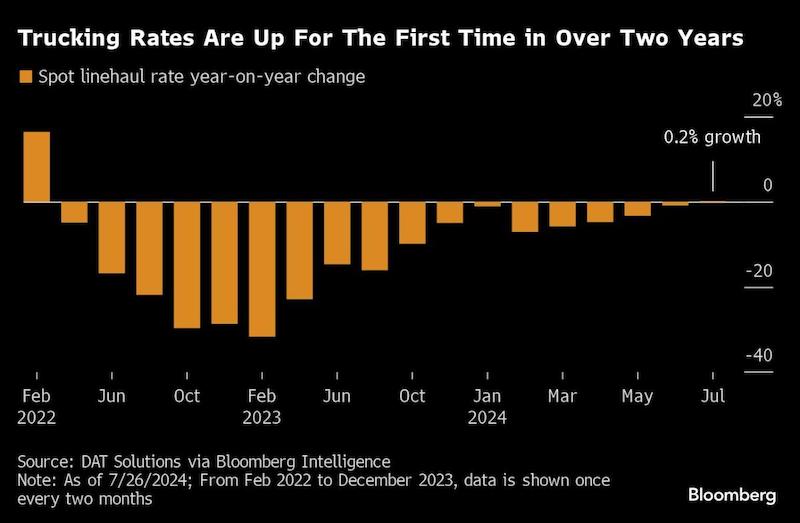Trucking executives in the US are fanning optimism that the end of their recession may be close as freight rates look set to grow for the first time in nearly two years.
The average cost of moving goods by truck is set to rise 0.2% year-on-year this month after 27 consecutive months of declines, according to freight marketplace DAT Solutions. Demand looks to be returning to pre-pandemic levels and trucking executives are talking up an impending recovery as their stock prices rise.
“If the trends over the past few months continue, we should see demand building as we exit the third quarter and some return of seasonal activity for the fourth quarter for the first time in years,” Knight-Swift Transportation Holdings Inc. Chief Executive Officer Adam Miller said on a Thursday earnings call.

Investors have seized on the rosy rhetoric. The Russell 3000 Trucking Index, which has 16 members including JB Hunt Transport Services Inc. and Old Dominion Freight Line Inc., was up 9% this month as of Thursday’s close, erasing its near 8% drop in the first half.
The optimism suggests one of the last industries still beset by pandemic-era disruptions may be finally recovering. Freight rates plummeted starting in early 2022 as American consumers emerged from Covid-19 restrictions and swapped their online shopping sprees for services, travel and experiences. The sudden shift left retailers with too much inventory and therefore less need for trucks to haul new orders.
“We seem to be coming out of that contractionary period that we were in for 26 or 27 months,” Ken Adamo, DAT Solutions’ analytics chief, said in a phone interview.
Retailers are finally getting through their inventory. Some have also brought forward shipments, hoping to avoid delays with ports in Asia and the Mediterranean backlogged amid attacks on ships in the Red Sea and dockworkers striking in the US.
JB Hunt saw intermodal volume — shipping freight from train to truck — rise by a double-digit percentage in Southern California in the second quarter, saying part of that was customers placing advance orders.
Still, some carriers and analysts are tempering expectations, saying profits are unlikely to suddenly soar back to pandemic-era highs. Manufacturing activity remains low, consumers are struggling and there remains an oversupply of trucks.
As many as 14% more truck drivers are on the road in the US compared with March 2020 while freight volumes are up just 4% over a similar period, according to freight consultancy FTR Trucking. And when goods finally arrive in the US, retailers aim to use rail because it’s cheaper.
“We’re at the beginning parts of hopefully a recovery in the industry, not in the later stages,” Robert Costello, chief economist at the American Trucking Associations, said in a phone interview.